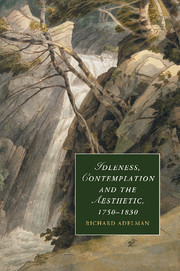Book contents
- Frontmatter
- Contents
- Acknowledgements
- List of abbreviations
- Introduction
- 1 The division of labour
- 2 Utilitarian education and aesthetic education
- 3 Cowper, Coleridge and Wollstonecraft
- 4 Coleridge's Pantisocracy, Biographia and Church and State
- Conclusion
- Epilogue: Wordsworth and Kingsley
- Notes
- Bibliography
- Index
- CAMBRIDGE STUDIES IN ROMANTICISM
3 - Cowper, Coleridge and Wollstonecraft
Published online by Cambridge University Press: 01 June 2011
- Frontmatter
- Contents
- Acknowledgements
- List of abbreviations
- Introduction
- 1 The division of labour
- 2 Utilitarian education and aesthetic education
- 3 Cowper, Coleridge and Wollstonecraft
- 4 Coleridge's Pantisocracy, Biographia and Church and State
- Conclusion
- Epilogue: Wordsworth and Kingsley
- Notes
- Bibliography
- Index
- CAMBRIDGE STUDIES IN ROMANTICISM
Summary
The space between physical activity and passive repose, that terrain of human activity tacitly and internally opened up by the thought of Smith and Ferguson, should not be understood simply to lie unnoticed or unexplored until the philosophical and educational projects of Bentham and Schiller. In a different set of registers and genres, a series of interrelated accounts of human experience and capability, beginning in the early 1780s, probe this territory repeatedly and carefully. Strikingly, this string of accounts of the potency and importance of idle thought seems to be set in motion by a recurrence of the very same logic that operated immanently in Ferguson's writing. In William Cowper's The Task of 1784, the most apparent result of the poet's almost unceasing examination of the ideas of employment – tasks – and retirement is the identification of types of occupation or attention that fit neither category. By setting out to consider the boundaries and connotations of labour and idleness, in line with Smith and Ferguson, Cowper must discover the manner in which these terms fail to map on to the range of human engagements his work records. Yet what stands out in Cowper, above and beyond the schematic (and hence in this respect limited) nature of those accounts of the division of labour, is his subsequent exploration of and engagement with the space that is left between employment and retirement.
- Type
- Chapter
- Information
- Idleness, Contemplation and the Aesthetic, 1750–1830 , pp. 68 - 101Publisher: Cambridge University PressPrint publication year: 2011
- 1
- Cited by



